Shatranj Ke Khilari: The Nawab, the Company Bahadur, the Noblemen, and a Game of Strategy
Literarily Speaking: Satyajit Ray’s 1977 movie adds context and detail to Munshi Premchand’s satirical Hindi tale
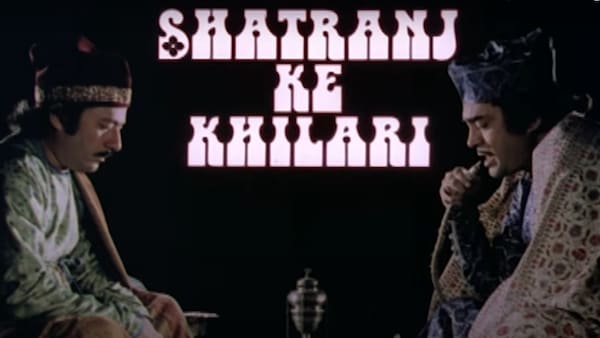
Last Updated: 07.14 PM, Jun 23, 2023
In our column, Literarily Speaking, we recommend specially-curated book-to-film adaptations that will leave you spell-bound
In 1856, Lucknow belonged to the kingdom of Awadh (or the anglicised Oudh), ruled by Nawab Wajid Ali Shah. The Nawab was known to be a patron of the arts and as much a practitioner as a dancer, singer, and poet.
Munshi Premchand’s satirical short story Shatranj ke Khilari is set in the last days of the Nawab’s reign when the East India Company annexed Awadh.
Two noblemen of Lucknow, Mirza Sajjad Ali and Mir Roshan Ali, are devoted to their daily game of chess. They are oblivious to the emotional needs of their families, avoid responsibility, and are unperturbed by the political happenings where the Company Bahadur (as the East India Company was referred to in local parlance) slowly increases its hold over the Nawab’s kingdom.
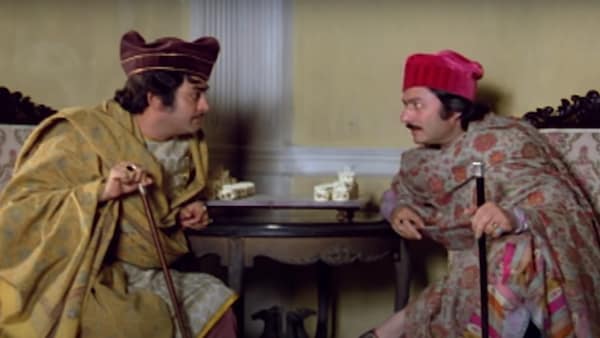
An additional context that Premchand provides is that the entire kingdom, from the Nawab to the citizens, is so steeped in the pursuit of art and pleasure that Mir and Mirza are emblematic of the culture of decadence in the Lucknow of that era.
Remarkably, neither the Nawab nor the East India Company Resident feature in the short story, only referred to in passing to add a rich context that ties in with the game of chess in the foreground.
The short story ends with the bloodless annexation of Awadh to the British Empire while Mir and Mirza wage their own war over the chessboard.
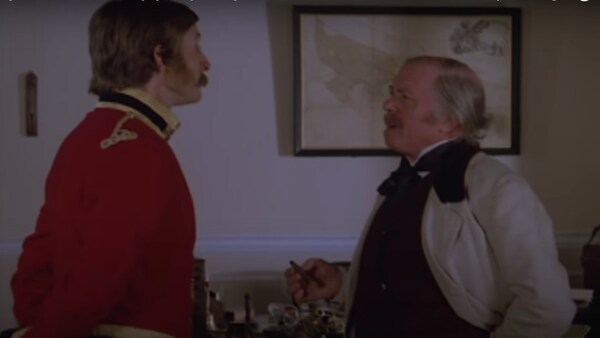
Satyajit Ray’s ‘Shatranj ke Khilari’ (1977)/The Chess Players
Premchand packs so many layers into this short story – a historical backdrop, the nature of male friendship, and the nature of addiction to chess that only an auteur like Satyajit Ray could have developed it into a nearly 2-hour feature film. A film that still holds its place as one of his finest ever made in India. Ray builds on the short story about the two noblemen chess players to include their households, Nawab Wajid Ali Shah, the East India Company, and the game of chess itself. The story switches between these threads, with every subplot having a pivotal scene.
So deep is their engagement with the game that one day, when the chess pieces go missing, Mirza (Sanjeev Kumar) and Mir (Saeed Jaffrey) make a courtesy call on an acquaintance hoping to use his chess set. But this turns out to be a test of social graces. They return to Mirza’s house to use vegetables and areca nuts as chess pieces, much to the chagrin of Mirza’s wife, Khurshid (Shabana Azmi).

Fed up with Khurshid’s nagging about his obsession with the game, Mirza suggests they move their daily chess sessions to Mir’s house. Mir’s young wife, Nafisa (Farida Jalal), is anxious about her affair coming to light, but her lover, Aqueel (Farooq Sheikh), is unperturbed. He is confident that chess players like Mir are too engrossed in the game to notice anything amiss.
While Satyajit Ray’s portrayal of Nawab Wajid Ali Shah (Amjad Khan) is based on historical accounts, it comes across as a caricature – that of a flamboyant royal who, besides being a devout Muslim and a patron of the arts, also likes to play dress up.
When the threat of an annexation reaches the Nawab’s court, he laments that his courtiers and ministers in whose hands he had entrusted the kingdom's administration, had let him down. He is perplexed about such a fate having befallen the kingdom when his subjects were far from unhappy with his rule. He recounts the glory days, especially the infantry, but even this describes in aesthetic terms rather than as military might.
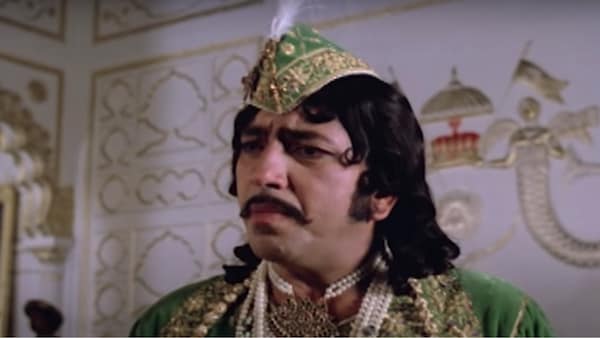
The Urdu-loving aide-de-camp of the East India Company, Captain Weston (Tom Alter), tries futilely to soften the stern Western gaze of the Resident, General James Outram (Richard Attenborough), who regards the Nawab’s many facets as eccentricities.
The scene where Outram outlines the strategy for the annexation of Oudh/Avadh parallels Mirza and Mir weighing their options on the chessboard before making their move.
To escape their responsibilities and play undisturbed, Mir and Mirza shift their game to a derelict structure on the banks of the river Gomti. In a serious turn of events, Mirza, irritated by the smug Mir’s winning streak, taunts him about being a cuckold. The argument escalates, and Mir draws his gun. But neither wants to lose a worthy chess opponent who is also a long-standing confidante, so Mir and Mirza reluctantly make peace.
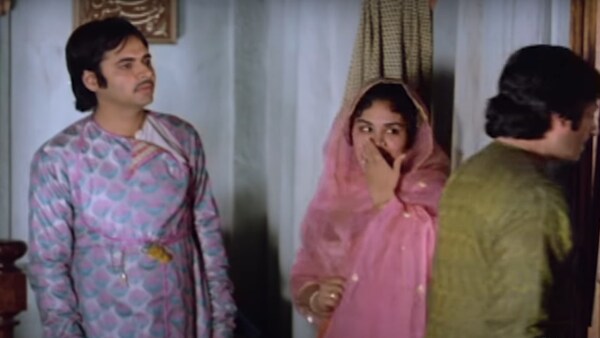
The Nawab, meanwhile, sees the sun set on his reign and decides to sign a new treaty ceding his power in return for a monthly purse.
The adaptation
There are jokes aplenty about Lucknow and the extremes to which its residents take their tehzeeb (culture) and mehmaan nawazi (hospitality). It is a thread that runs through the movie, even in the narration by Amitabh Bachchan, retaining some light-hearted tone in an otherwise serious story.
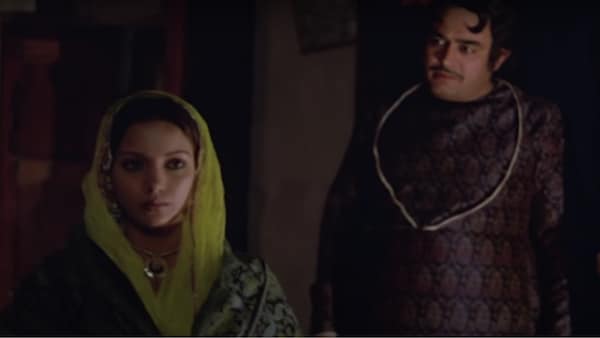
Mirza and Mir are depicted as indolent, reluctant to take up any activity, leave alone pick up arms to defend their Nawab. All their valour is in defending their respective kings on the chessboard, while their Nawab becomes a pawn in the larger political strategy of the East India Company.
Ray adds a dimension to Mirza as the more astute of the chess-playing duo, with an insightful understanding of the politics playing out in the kingdom. There is also a character called Munshi Nandlal (David Abraham), who details the difference between the Indian rules of chess and the English ones. The impatience of the English in finishing the game of strategy is implied, whether on the chessboard or in the annexation of Awadh.
In a movie rich with music composed by Ray, he has Amjad Khan sing Nawab Wajid Ali Shah’s Tadap tadap sagari rain gujari. But Ray sidesteps the use of the more famous Babul Mora, a song of bidai or departure composed by the Nawab who likens his banishment from Lucknow to a bride leaving her beloved father’s home. In some ways, the song’s absence in the film still evokes emotions among those in the audience aware of this piece of trivia.
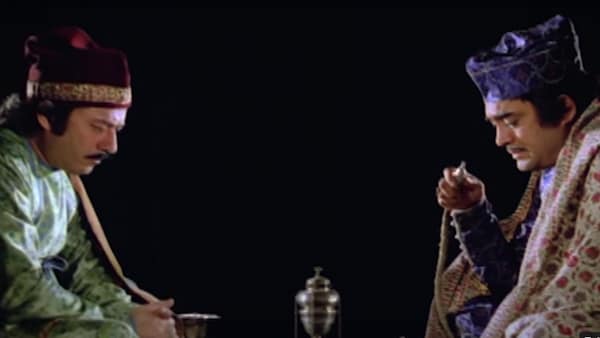
You can watch Shatranj Ke Khilari here.
(Views expressed in this piece are those of the author, and do not necessarily represent those of OTTplay)
(Written by Saritha Rao Rayachoti)

 Premium
Premium